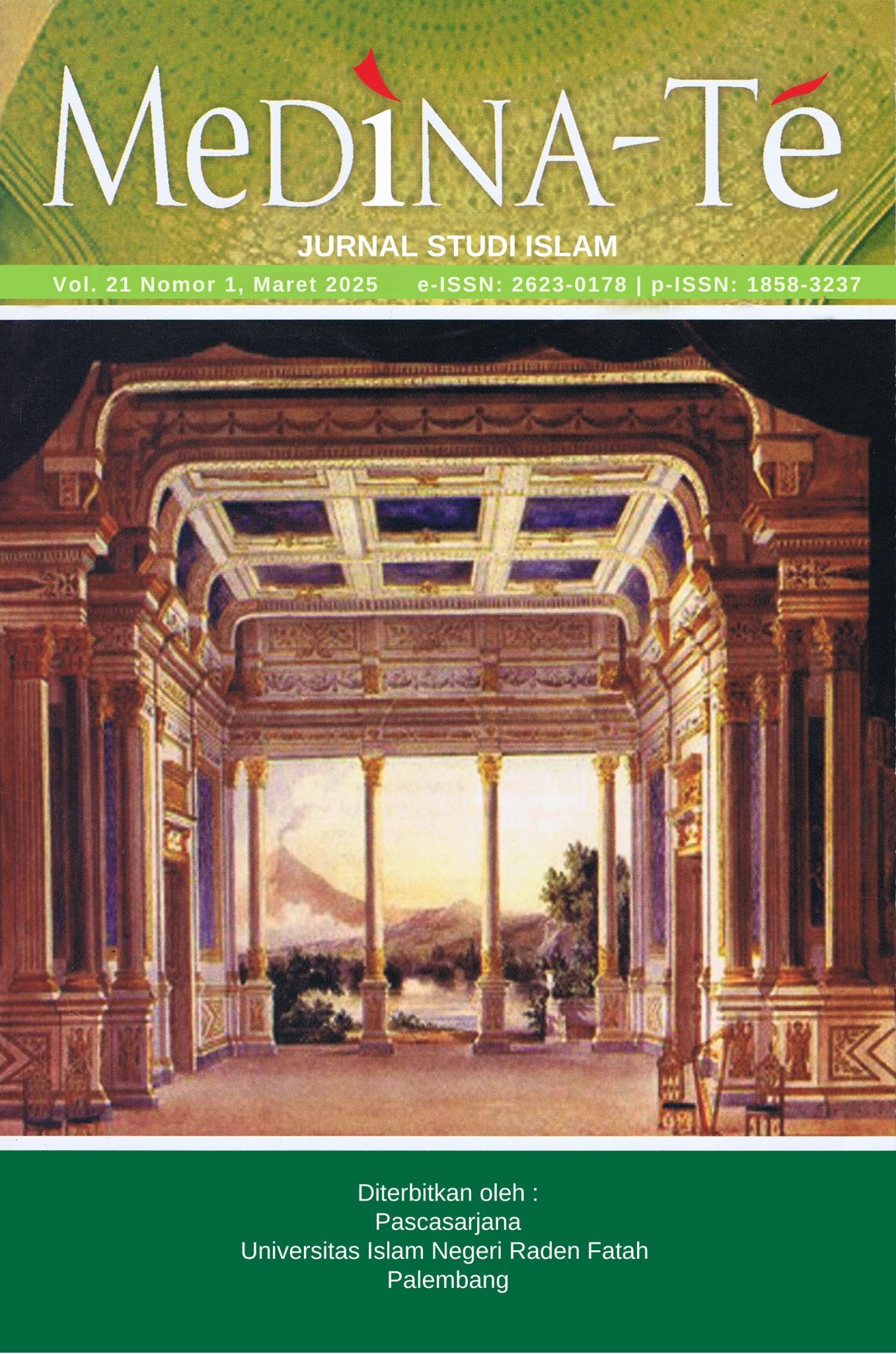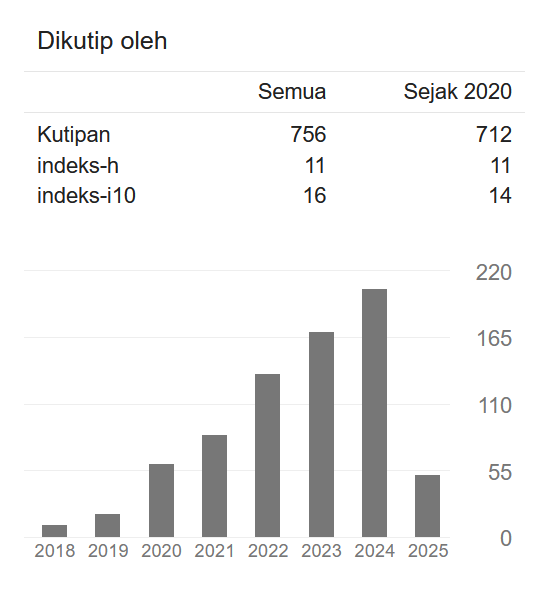Qailulah in the Perspective of Islamic Neuroscience: Implications for Students' Mental and Cognitive Well-being
DOI:
https://doi.org/10.19109/medinate.v21i1.27895Keywords:
Qailulah, Islamic neuroscience, mental health, cognitive performance, studentsAbstract
This study aims to explore the concept of Qailulah—a short midday nap encouraged in Islamic teachings—from the perspective of Islamic neuroscience, and analyze its implications for students’ mental and cognitive health. Using a qualitative literature review method, this research collected data from Islamic texts and contemporary neuroscience studies to identify overlapping insights and establish theoretical integration. A descriptive-comparative analysis was employed to examine the relevance of Qailulah to the cognitive performance and psychological well-being of students. The findings reveal that Qailulah not only holds spiritual significance in Islam but also provides scientifically measurable benefits. Neuroscientific evidence shows that short naps can enhance memory consolidation, reduce cortisol levels, improve mood regulation, and strengthen executive brain functions such as attention, emotional control, and decision-making. From an educational standpoint, Qailulah can be adopted as a holistic intervention to mitigate stress, prevent academic burnout, and enhance students’ learning efficiency. The study concludes that integrating Qailulah into modern educational practices can foster balanced student development by aligning spiritual practices with scientific understanding.
References
Dewi, Riskha Dora Candra. 2024. EMPOWERING MINDS: Strategi Dan Sumberdaya Untuk Meningkatkan Kesehatan Mental Di Kalangan Anak Sekolah Dan Mahasiswa. Kalimantan Selatan: Ruang Karya.
Fadzil, Nur Farhana, and Siti Amira Othman. 2021. “Interrelation between Qai’lullah, Blue Light Exposure and Neurocognitive Performances: A Short Review.” Journal of Quranic Sciences and Research 2(2): 1–7. doi:10.30880/jqsr.2021.02.02.001.
Fan, Jieyi, Liang Wang, Xiaotian Yang, Xiangbo Zhang, Ziyao Song, Sifan Wu, Linru Zou, et al. 2022. “Night Shifts in Interns: Effects of Daytime Napping on Autonomic Activity and Cognitive Function.” Frontiers in Public Health 10: 1–14. doi:10.3389/fpubh.2022.922716.
Farhadian, Negin, Habibolah Khazaie, Mohammad Nami, and Sepideh Khazaie. 2021. “The Role of Daytime Napping in Declarative Memory Performance: A Systematic Review.” Sleep Medicine 84: 134–41. doi:https://doi.org/10.1016/j.sleep.2021.05.019.
George, A Shaji, A S Hovan George, and Aakifa Shahul. 2024. “The Science and Timing of Power Naps: Investigating the Cognitive and Physical Benefits of Brief Daytime Sleep.” Partners Universal Innovative Research Publication 2(1): 70–84. doi:10.5281/zenodo.10673171.
Ikawati, Yani, Dhewi Nurahmawati, and Mulazimah. 2021. “Pengaruh Puasa Ramadhan Terhadap Kecukupan Jam Tidur.” Sinkesjar 1(1): 840–56. doi:10.29407/seinkesjar.v1i1.1304.
Kadepa, Merry C R, Wahyuni L Atmodjo, and Shirley I Moningkey. 2025. “Hubungan Antara Kualitas Tidur Dengan Suasana Hati Pada Mahasiswa Fakultas Kedokteran Universitas Pelita Harapan.” Journal of Medicine and Health (JMH) 7(1): 49–58. doi:https://doi.org/10.28932/jmh.v7i1.9606.
Khairani, Masayu Dian. 2020. “Prilaku Hidup Bersih Dan Sehat: Perspektif Al-Qur’an Dan Sunnah Rasul.” Journal of Darussalam Islamic Studies 1(1): 31–44. doi:10.47747/jdis.v1i1.89.
Li, Junxin, Miranda V. McPhillips, Zhongyue Deng, Fangfang Fan, and Adam Spira. 2023. “Daytime Napping and Cognitive Health in Older Adults: A Systematic Review.” Journals of Gerontology - Series A Biological Sciences and Medical Sciences 78(10): 1853–60. doi:10.1093/gerona/glac239.
Li, Wei, Lin Sun, Ling Yue, and Shifu Xiao. 2024. “Associations between Afternoon Napping, Left Amygdala Volume and Cognitive Performance in Elderly with Normal Cognitive Function.” Sleep Medicine 113: 232–37. doi:https://doi.org/10.1016/j.sleep.2023.11.032.
Lou, Sijia, Sifan Hu, Yun Chen, Kangqing Zhao, Yingying Zhou, Jianjun Hou, Lining Liang, and Hongqiang Sun. 2024. “Benefits of Napping Habits in Healthy Adults: Maintaining Alerting Performance and Cortisol Levels Change within 90 Min of Habitual Napping Time.” Sleep Medicine 119: 214–21. doi:https://doi.org/10.1016/j.sleep.2024.04.021.
Mar’i, Joud, Robert Zhang, Stanislav Mircic, Étienne Serbe-Kamp, Matthias Meier, Aljoscha Leonhardt, Michael Drews, et al. 2025. “Study While You Sleep: Using Targeted Memory Reactivation as an Independent Research Project for Undergraduates.” Advances in physiology education 49(1): 1–10. doi:10.1152/advan.00056.2024.
Mason, Lucia, Angelica Ronconi, Sara Scrimin, and Francesca Pazzaglia. 2022. “Short-Term Exposure to Nature and Benefits for Students’ Cognitive Performance: A Review.” Educational Psychology Review 34(2): 609–47. doi:10.1007/s10648-021-09631-8.
Masronia, Nurjanah, and Darmawanita. 2024. “Islam Dan Gaya Hidup Sehat: Sunnah Nabi Dalam Pola Makan, Tidur Dan Kebersihan.” Journal of Innovative and Creativity 4(2): 31–36.
Mehta, Kosha J. 2022. “Effect of Sleep and Mood on Academic Performance—at Interface of Physiology, Psychology, and Education.” Humanities and Social Sciences Communications 9(1): 1–13. doi:10.1057/s41599-021-01031-1.
Nor, Zaswiza Mohamad, Nurul Nabilah Yusoff, Fasiha Ruhila Fakhrol Razi, and Nurul Atiqah Sanusi. 2016. “A Good Night’s Sleep: A Narrative Review from Islamic Perspectives in Relation to Modern Sciences.” International Medical Journal Malaysia 17(Specialissue2): 117–22.
Novianti, Ameliani Nisa, and Murni Murni. 2024. “Pembiasaan Program Qailulah Dalam Meningkatkan Disiplin Waktu Belajar Di Era Digitalisasi Peserta Didik Kelas I SDIT Cahaya Fikri Bontang Tahun Pelajaran 2023/2024.” NABAWI: Jurnal Penelitian Pendidikan Islam 2(1): 182–98.
Paller, Ken A., Jessica D. Creery, and Eitan Schechtman. 2022. “Memory and Sleep: How Sleep Cognition Can Change the Waking Mind for the Better.” ANNUAL REVIEW OF PSYCHOLOGY 72: 123–50. doi:10.1146/annurev-psych-010419-050815.Memory.
Pamuji, Slamet. 2024. “Tidur Siang Sebagai Upaya Peningkatan Konsentrasi Belajar Pada Siswa SD Muhammadiyah 4 Zamzam.” Jurnal Intelek Dan Cendikiawan Nusantara 1(1): 167–74. https://jicnusantara.com/index.php/jicn.
Paz, Valentina, Hassan S. Dashti, and Victoria Garfield. 2023. “Is There an Association between Daytime Napping, Cognitive Function, and Brain Volume? A Mendelian Randomization Study in the UK Biobank.” Sleep Health: Journal of the National Sleep Foundation 9(5): 786–93. doi:10.1016/j.sleh.2023.05.002.
Riad, Irham, and Muhammad Zainal Khadafi. 2023. “Qailullah (Tidur Siang) Dalam Tradisi Sunnah: Manfaatnya Bagi Kesehatan Dan Produktivitas.” Jurnal Religion: Jurnal Agama, Sosial, dan Budaya 1(6): 1301–15. doi:https://doi.org/10.55606/religion.v1i6.831.
Riani. 2024. “Implementasi Qailulah Dalam Meningkatkan Kualitas Belajar Siswa SD Kelas 1/1 Satit Phatnawitya, (Yala, Thailand).” INNOVATIVE: Journal Of Social Science Research 4(2): 7505–16. doi:https://doi.org/10.31004/innovative.v4i2.10174.
Ru, Taotao, Liu Qian, Qingwei Chen, Hailing Sun, and Guofu Zhou. 2022. “Effects of an Afternoon Nap on Sustained Attention and Working Memory: The Role of Physiological Arousal and Sleep Variables.” International Journal of Psychophysiology 179: 21–29. doi:https://doi.org/10.1016/j.ijpsycho.2022.06.013.
Salim, Ahmad. 2017. Berburu Surga Bersama Nabi. Yogyakarta: Safirah.
Setiyowati, Arbin Janu, Indriyana Rachmawati, and Riskiyana Prihatiningsih. 2021. Academic Burnout Siswa Dan Implikasinya Terhadap Layanan Bimbingan Dan Konseling Di Sekolah. Malang: Media Nusa Creative.
Souabni, Maher, Omar Hammouda, Mohamed Romdhani, Khaled Trabelsi, Achraf Ammar, and Tarak Driss. 2021. “Benefits of Daytime Napping Opportunity on Physical and Cognitive Performances in Physically Active Participants: A Systematic Review.” Sports Medicine 51: 2115–2146.
Staresina, Bernhard P. 2024. “Coupled Sleep Rhythms for Memory Consolidation.” Trends in Cognitive Sciences 28(4): 339–51. doi:10.1016/j.tics.2024.02.002.
Susilawati, Ika Rahma, Omar Khalifa Burhan, Ridwan Aji Budi Prasetyo, Sofia Nuryanti, Ika Adita Silviandari, Fatiya Halum Husna, Selly Dian Widyasari, and Ika Widyarini. 2024. Isu-Isu Terkini Psikologi Industri Dan Organisasi. Malang: UB Press.
Sweller, John, Paul Ayres, and Slava Kalyuga. 2011. Cognitive Load Theory. New York: Springer Science+Business Media, LLC.
Trianti, Elis, Heryana Nugraha, Shania Ayu Bestira, Syarif Hidayatulloh, and Maslani. 2024. “Kajian Hadis Tarbawi : Pola Tidur Dan Pengaruhnya Bagi Kualitas Belajar Siswa.” SAKOLA - Journal of Sains Cooperative Learning and Law 1(2): 208–22. doi:10.57235/sakola.v1i2.3258.
Tumiran, Mohd Amzari, Noor Naemah Abdul Rahman, Rohaida Mohd Saat, Nurul Kabir, Mohd Yakub Zulkifli, and Durriyyah Sharifah Hasan Adli. 2018. “The Concept of Qailulah (Midday Napping) from Neuroscientific and Islamic Perspectives.” Journal of Religion and Health 57(4): 1363–75. doi:10.1007/s10943-015-0093-7.
Wulandari, Widiana Putri, and Andris Nurita. 2024. “Study Of The Meaning Of The Prohibition Of Sleeping After Fajr With A Scientific Approach In The Hadith Narrated By Abu Daud Index Number 2606.” Taqaddumi: Journal of Quran and Hadith Studies 4(1): 28–38. doi:10.12928/taqaddumi.v4i1.8523.
Yugo, Tri. 2024. “Tinjauan Az Zarnuji Terkait Relevansi Kewajiban Dan Hak Peserta Didik Dalam Konteks Pendidikan Modern.” Tarbiyah Islamiyah: Jurnal Ilmiah Pendidikan Agama Islam 14(1): 17–37. doi:10.18592/jtipai.v14i1.12628.
Zeng, Shengzi, Xuanyi Lin, Jingxuan Wang, and Xiaoqing Hu. 2021. “Sleep’s Short-Term Memory Preservation and Long-Term Affect Depotentiation Effect in Emotional Memory Consolidation: Behavioral and EEG Evidence.” Sleep Research Society 44(11): 1–14. doi:10.1093/sleep/zsab155.








